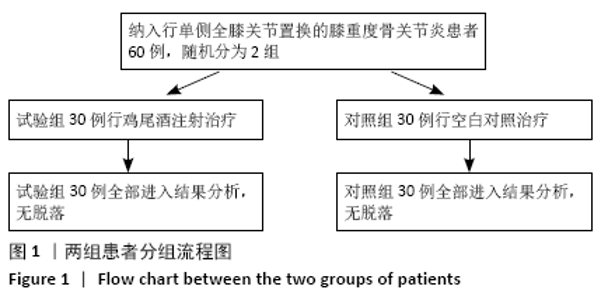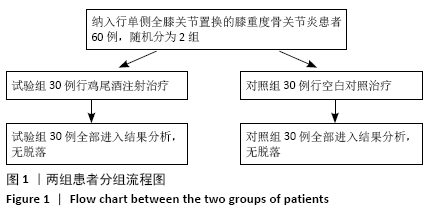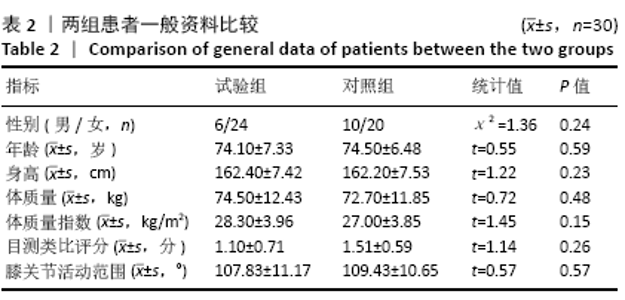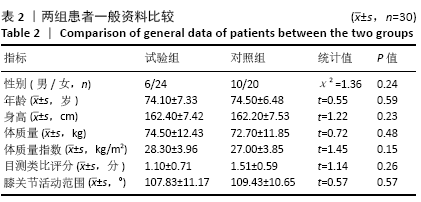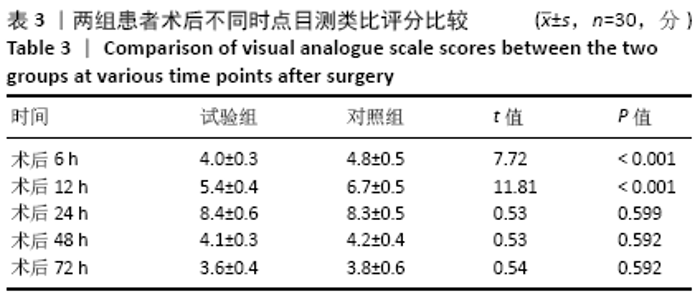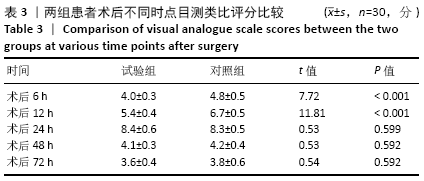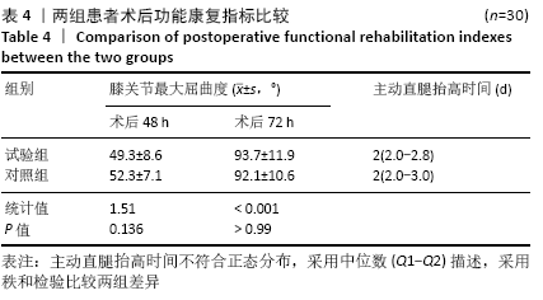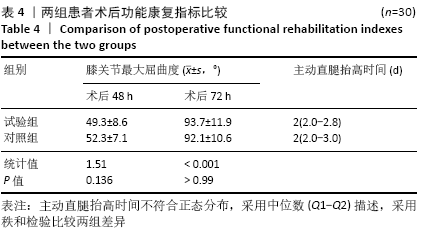[1] 周宗科,翁习生,曲铁兵,等. 中国髋、膝关节置换术加速康复——围术期管理策略专家共识[J]. 中华骨与关节外科杂志,2016,9(1):1-9.
[2] GHOSH A, CHATTERJI U. An evidence-based review of enhanced recovery after surgery in total knee replacement surgery. J Perioper Pract. 2019;29(9):281-290.
[3] BOURNE RB, CHESWORTH BM, DAVIS AM, et al. Patient Satisfaction after Total Knee Arthroplasty: Who is Satisfied and Who is Not? Clin Orthop Relat Res. 2010;468(1):57-63.
[4] ANDERSEN LO, KEHLET H. Analgesic efficacy of local infiltration analgesia in hip and knee arthroplasty: a systematic review. Br J Anaesth. 2014;113(3):360-374.
[5] ISHIKAWA M. Kinematic alignment produces near-normal knee motion but increases contact stress after total knee arthroplasty: A case study on a single implant design. Knee. 2015;22(3):206-212.
[6] ZHAO D, MA XL, WANG WL, et al. Effectiveness evaluation between enhanced recovery after surgery and traditional treatment in unilateral total knee arthroplasty. Zhonghua Yi Xue Za Zhi. 2018;98(7):519-523.
[7] ZHU S, QIAN W, JIANG C, et al. Enhanced recovery after surgery for hip and knee arthroplasty: a systematic review and meta-analysis. Postgrad Med J. 2017;93(1106):736-742.
[8] JIANG HH, JIAN XF, SHANGGUAN YF, et al. Effects of enhanced recovery after surgery in total knee arthroplasty for patients older than 65 years. Orthop Surg. 2019;11(2):229-235.
[9] PARVIZI J, MILLER AG, GANDHI K. Multimodal pain management after total joint arthroplasty. J Bone Joint Surg Am. 2011;93(11):1075-1084.
[10] HANNON CP, KEATING TC, LANGE JK, et al. Anesthesia and Analgesia Practices in Total Joint Arthroplasty: A Survey of the American Association of Hip and Knee Surgeons Membership. J Arthroplasty. 2019;34(12):2872-2877.
[11] CHEN H, GONG L, GUO ZR, et al. Predictive Value of High-Sensitive Cardiac Troponin T (cTnT) for Adverse Cardiac Events in Patients Undergoing Primary Total Knee Arthroplasty (TKA). J Orthop Sci. 2019: S0949-2658(19)30271-4.
[12] TABOADA M, ALVAREZ J, CORTÉS J, et al. The Effects of Three Different Approaches on the Onset Time of Sciatic Nerve Blocks With 0.75% Ropivacaine. Anesth Analg. 2004;98:242-247.
[13] CAMPBELL A, MCCORMICK M, MCKINLAY K, et al. Epidural vs. lumbar plexus infusions following total knee arthroplasty: randomized controlled trial. Eur J Anaesthesiol. 2008;25(6):502-507.
[14] 丁兆永,丁华明,刘祥臣. 腰丛-坐骨神经阻滞对膝关节置换围术期影响[J]. 中国矫形外科杂志,2020,28(6):517-521
[15] 王发兴,武旖旎,代虹,等.超声引导腰丛-坐骨神经阻滞麻醉在老年人工膝关节置换术中的应用研究[J] .实用药物与临床,2019, 22(8):820-822.
[16] KIM YM, KANG C, JOO YB, et al. The role of ultrasound-guided single-shot femoral and sciatic nerve blocks on pain management after total knee arthroplasty. Knee. 2019;26(4):881-888.
[17] ROSS JA, GREENWOOD AC, SASSER PR, et al. Periarticular Injections in Knee and Hip Arthroplasty: Where and What to Inject. J Arthroplasty. 2017;32(9S):S77-S80.
[18] TAMMACHOTE N, KANITNATE S, MANUWONG S, et al. Periarticular multimodal drug injection is better than single anesthetic drug in controlling pain after total knee arthroplasty. Eur J Orthop Surg Traumatol. 2018;28(4):667-675.
[19] JIANG J, TENG Y, FAN Z, et al. The efficacy of periarticular multimodal drug injection for postoperative pain management in total knee or hip arthroplasty. J Arthroplasty. 2013;28(10):1882-1887.
[20] BUSCH CA, SHORE BJ, BHANDARI R, et al. Efficacy of periarticular multimodal drug injection in total knee arthroplasty. A randomized trial. J Bone Joint Surg Am. 2006;88(5):959-963.
[21] 彭慧明,唐杞衡,钱文伟,等.膝关节周围注射镇痛在全膝关节置换术后多模式镇痛方案中的作用[J]. 中华骨科杂志,2016,36(7):406-412.
[22] SHI ZB, DANG XQ. Efficacy of multimodal perioperative analgesia protocol with periarticular medication injectionand nonsteroidal anti-inflammatory drug use in total knee arthroplasty. Niger J Clin Pract. 2018;21(9):1221-1227.
[23] YAYAC M, LI WT, ONG AC, et al. The Efficacy of Liposomal Bupivacaine Over Traditional Local Anesthetics in Periarticular Infiltration and Regional Anesthesia During Total Knee Arthroplasty: A Systematic Review and Meta-Analysis. J Arthroplasty. 2019;34(9):2166-2183.
[24] SUN H,HUANG Z, ZHANG Z, et al. A Meta-Analysis Comparing Liposomal Bupivacaine and Traditional Periarticular Injection for Pain Control after Total Knee Arthroplasty. J Knee Surg. 2019;32(3):251-258.
[25] ZLOTNICKI JP, HAMLIN BR, PLAKSEYCHUK AY, et al. Liposomal Bupivacaine vs Plain Bupivacaine in Periarticular Injection for Control of Pain and Early Motion in Total Knee Arthroplasty: A Randomized, Prospective Study. J Arthroplasty. 2018;33(8):2460-2464.
[26] LUBER MJ, R GREENGRASS R, VAIL TP, et al. Patient Satisfaction and Effectiveness of Lumbar Plexus and Sciatic Nerve Block for Total Knee Arthroplasty. J Arthroplasty. 2001;16(1):17-21.
[27] 廖晖,李光辉,万里.等.连续腰丛联合坐骨神经阻滞对全膝关节置换术后疼痛及早期疗效的影响[J].中国疼痛医学杂志,2012, 18(10):614-617. |
